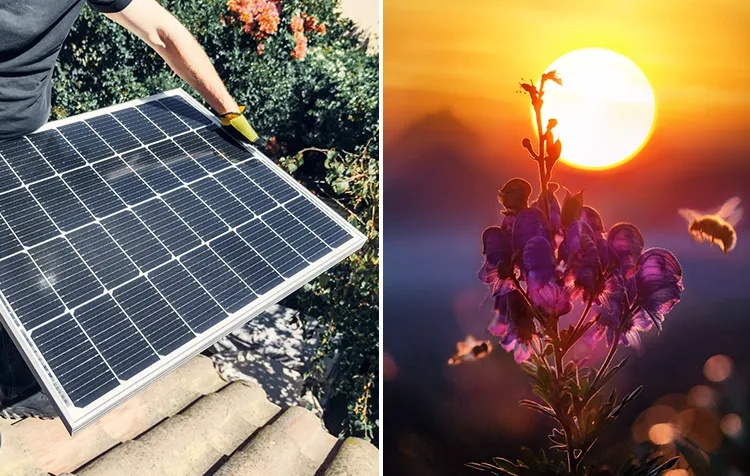What exactly is solar energy? If you want to answer this question and literally shed some light on the subject, you've come to the right place! For billions of years, the sun has given us light and heat - and thus made life on our planet possible. This powerful environmentally friendly energy source is available to us in infinite quantities and can be used in the most diverse forms.
Especially in the course of the global energy transition and the need for renewable alternatives to fossil fuels, the power of the sun's rays is finally getting the attention it deserves. But how does it actually work with photovoltaic systems? And what else can we as consumers do to harness the benefits of solar power for ourselves?
In this article I would like to give you everything you need to know about solar energy - from its definition and history, advantages and disadvantages and the technology, to the possible uses and future prospects. Let's go!
Here you can find a short overview in advance:
Definition: What is solar energy actually?
Solar energy (often referred to as solar power, solar energy or solar power) is the Solar radiation energywhich is created inside the sun by nuclear fusion, radiates to the earth and can be used by us humans mainly in the form of electric power or heat.
This is a natural and renewable energy sourcewhich has existed for billions of years and which makes life on our planet possible in the first place. Plants convert sunlight into energy through photosynthesis - and animals and humans use the sun's rays to produce essential energy. Vitamin D produce.
In technical terms, however, the term "solar energy" refers primarily to the Methods and technologiesdeveloped by humans to convert electromagnetic radiation into usable forms of energy, such as electricity or heat.
At the heart of the further development of solar energy is above all the goal of achieving a clean, environmentally friendly and sustainable energy source to meet mankind's increasing energy needs in the future while at the same time reducing the serious environmental impacts (especially the climate change) by conventional, finite energy sources, such as coal, oil and natural gas.
History: How long has solar energy been used?
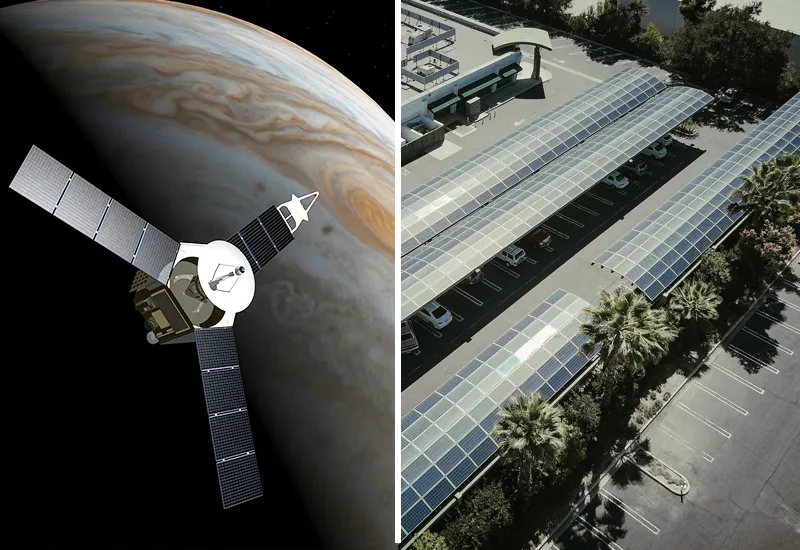
In the next step, I would like to take a brief look at the history of solar power, which begins at least as early as 1839. Here I have listed the sequence of some of the most important events with the respective year:
- 1839: French physicist Alexandre Edmond Becquerel discovers the photoelectric effect.
- 1883: U.S. inventor Charles E. Fritts builds the first working solar cell.
- 1905: Albert Einstein proves and explains the photoelectric effect. He realized that light has particles that can transfer energy to other particles.
- 1954: The former research department of the telephone company AT&T, Bell Laboratories, develops a Silicon based solar cell.
- 1958: In March, Vanguard-1, the fourth satellite, is launched into Earth orbit. It is the first space satellite to operate on electricity from solar cells.
- 1990: Solar research and photovoltaic systems in Germany is discontinued as a result of nuclear accidents and the oil crisis. promoted in a targeted manner.
- 2000: The "Renewable Energy Sources Act" enters into force in order to promote the expansion of solar energy and further renewable energies massively accelerate.
- 2022: Baden-Württemberg is the first major state to introduce mandatory solar for new residential construction.
But the story of solar energy is far from over; on the contrary, it is just beginning. Because today it is one of the largest supply sectors of the future and a crucial piece of the puzzle for a sustainable lifestyle.
Advantages and disadvantages: Why is solar energy used and what are the arguments against it?
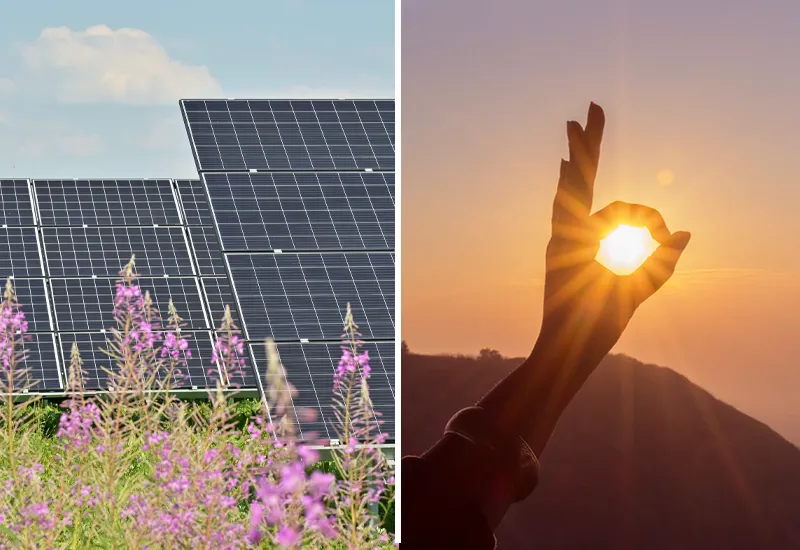
In 2022, around 11 percent of the electricity fed into the grid in Germany was generated by PV systems. And the share of photovoltaics in gross electricity generation in Germany continues to increase with each passing year.₁
But what exactly are the advantages? And does the most modern technology of solar energy also have disadvantages? In the following I would like to give you a small overview provide
Advantages of solar energy
- Environmental friendliness: Solar energy is a clean and emission-free energy source. The production of solar power does not produce pollutants and greenhouse gases harmful to the climate, which not only decelerates climate change, but also reduces the Air pollution reduced can be.
- Inexhaustibility: Solar energy, unlike fossil fuels, is a renewable energy source. As long as the sun shines, we humans can always use it.
- Cost savings: After the initial investment, consumers can significantly reduce their electricity bills over the long term with the help of solar installations. In addition, PV system owners in many countries benefit from tax incentives and government subsidies.
- Revenue Source: Owners of large solar systems can earn money by feeding the electricity into the grid, and can also Sell photovoltaic systemFor example, when a real estate sale or a new investment is pending.
- IndependenceConsumers who use and store solar energy reduce their dependence on fossil fuels and are thus better protected against rising electricity prices. Likewise, countries like Germany are less dependent on energy imports from third countries.
- Reliability: Solar systems provide reliable power and require relatively little maintenance - compared to other power generation systems - which of course also reduces running costs.
- …
The list of benefits is much longer. For example, the solar industry also creates many new jobs in research, development, installation and maintenance - and enables further efficiency gains and cost reductions in the future.
Disadvantages of solar energy
- Initial investment: The biggest point of criticism is certainly the high initial cost of a photovoltaic system. However, the expensive purchase of solar panels can be avoided, for example, by renting the technology.
- Weather dependency: Of course, the amount of electricity generated always varies with the weather and the season. On cloudy or rainy days, less solar energy is produced accordingly. However, the fact that solar energy can now be stored very well counteracts this problem.
- Long payback period: Despite falling prices, the investment in a PV system pays for itself on average after about 9-10 years.₂ However, since it reliably supplies electricity for 25 years or even longer, it is usually a good financial investment.
- Business registration: Anyone operating a photovoltaic system in Germany may have to register a commercial activity. The profit of solar energy on your own roof can therefore be associated with bureaucratic effort - but of course it is usually worth it.
- …
Of course, there are also some other disadvantages, such as the decreasing performance over time. However, since the technology is always evolving, this problem can be further counteracted in the future.
Technology: How does solar energy actually work, simply explained?
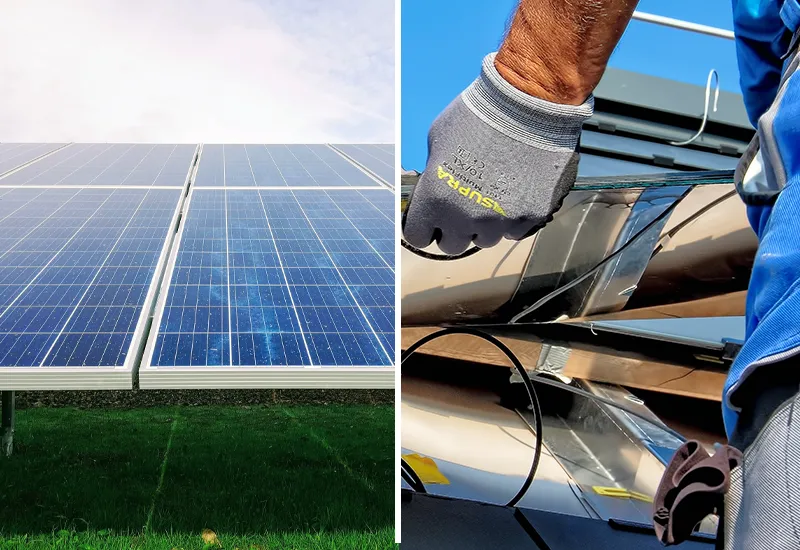
Solar energy uses the sun's radiant energy both to generate electricity through Photovoltaics, as well as to provide heat for hot water through Solar thermal to generate.
Photovoltaics uses solar cells that convert sunlight directly into electrical energy. When photons (microscopic energy carriers from sunlight) strike the front of a solar cell, they set off Electrons in motionwhich then generates electrical power. Solar modules or panels ultimately connect several of these solar cells in series.
At the Solar thermal the energy of the sun's rays is captured with the help of an absorber of the solar collectors and converted into thermal energy to heat water or another medium. The thermal energy can then be used with the help of heat exchangers, for example, to heat water for drinking and for the sustainable heating of the apartment or house can be used.
Use: How can you benefit from solar energy in everyday life?
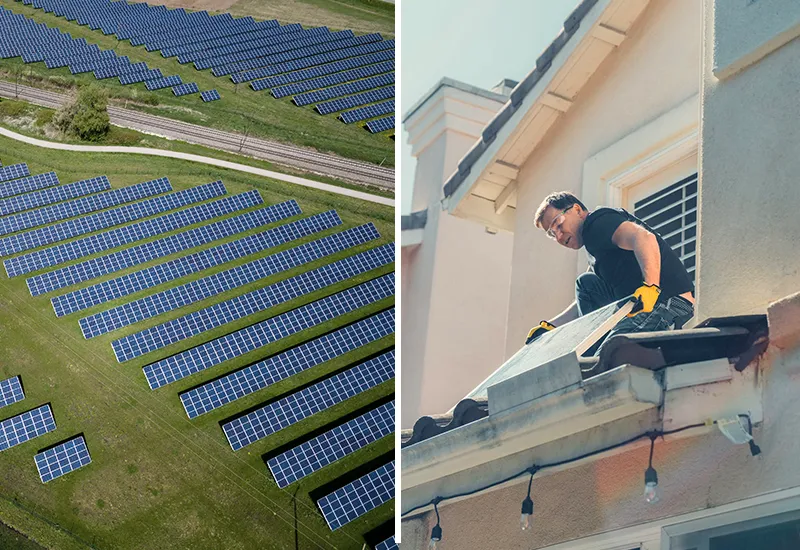
We consumers are faced with many different possibilities ready to use the advantages of solar energy in everyday life and thus actively contribute to a sustainable energy supply.
The easiest way is certainly (if not already done) the 5-minute Switch to a green power supplier. More and more companies are offering rates that completely on electricity from renewable sources, including solar energy.
Apart from this, there are now also, for example Solar chargers for cell phones and other small electrical appliances. Also can Solar outdoor lights be used for gardens or terraces, storing solar energy during the day and providing light at night. Solar-powered water pumps and cars, solar ovens or decorative Solar canning jars are just a few more ways in which solar energy can be used in everyday life.
If you want to go one step further, you not only use solar energy, but also generate it with the help of the already mentioned Photovoltaic system on its own roof itself. This not only makes it possible to charge the electric car and cover one's own electricity needs, but also to profitably feed surplus energy into the grid. In addition, consumers can use Solar thermal systems capture the heat of the sun and use it to heat water or support heating.
Tip: Sometimes the roof surface is not suitable for a PV system. Fortunately, solar panels can also be installed on the side of the balcony railing. What other tips do you have for the best possible Sustainable balcony I'll be happy to explain how you can do this in the linked blog post.
Solar Energy - Harnessing the Infinite Power of the Sun for a More Sustainable Way of Life
The sun is the largest natural energy supplier on our planet! The inexhaustible reservoir of solar power has the potential to provide us with a sustainable source of energy in the long term and to end the era of fossil fuels once and for all.
By becoming more aware of the benefits of solar energy and increasingly integrating the renewable energy source into our way of life, we are making a significant contribution to improving our reduce ecological footprint. In this way, we also enable future generations - including our children and grandchildren - to live comfortably on Earth.
"When the sun is shining I can do anything; no mountain is too high, no trouble too difficult to overcome."
Wilma Rudolph (more at Sunshine Quotes)
Do you have questions, ideas, do you want to share your experiences with solar energy or tips for a fossil-free life? Then I look forward to your comment.
Stay sunny and environmentally friendly,

PS: Who save CO2 in everyday life should switch to electricity from renewable sources such as solar energy. I'll be happy to explain what else you can do next in the linked blog article!
References:
₁ Federal Statistical Office: Figure of the Week No. 25 of June 20, 2023 - 2.6 million photovoltaic systems installed in Germany, available at https://www.destatis.de/DE/Presse/Pressemitteilungen/Zahl-der-Woche/2023/PD23_25_p002.html. [06.09.2023].
₂ N. Kumpel: The amortization of a PV system (as of 07.07.2023), available at https://www.wegatech.de/ratgeber/photovoltaik/kosten-und-wirtschaftlichkeit/amortisation. [06.09.2023].

